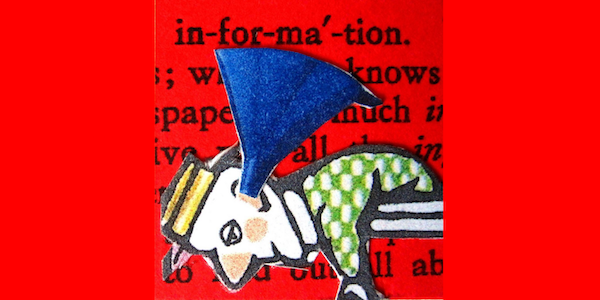
Vincent: I’m gonna take a piss.
Mia: That’s a little bit more information than I needed, Vince, but go right ahead.
– Pulp Fiction
Too much information. The witty reply has become so popular it even has its own acronym, TMI. Snarky retort aside, is it true in a broader sense? Is our society really drowning in information overload?
The internet promises the potential of an information society awash in “knowledge and intelligence,” which is actually the definition of “information,” according to my go-to dictionary Merriam-Webster. But is there really too much of it – information, that is?
To me we have more of a misinformation society. Not only that, what little information there is online is getting harder and harder to find every day.
Depending on what you’re searching for there’s too much redundancy, fake news and BS, and oftentimes way too much of all three. So much that it’s becoming ridiculously time consuming and maddeningly frustrating to find any real knowledge or intelligence on the internet.
Take this explosive scandal that just hit the wine world the other day. A proctor helped a student cheat on the notoriously difficult blind tasting portion of the master sommelier exam. Apparently that student shared what he/she knew with others and since nobody knows who cheated and who didn’t, 23 masters who originally passed were stripped of their title.
To put in perspective just how suspicious it should have been that so many passed what’s known as the hardest exam on Earth, just 273 people in the world have earned the Master Sommelier diploma since its inception in 1969. Only nine people have passed the test on their first try.
If you Google “sommelier scandal” you’ll be confronted with hundreds of thousands of results, pages and pages of articles and blog posts spewing the same essential facts, salacious rhetoric and obligatory quotes about the heartbreak of having that coveted title ripped away, how those who passed legitimately may never pass again, yada yada.
You’ll have to wade through dozens of verbose pieces before learning that Reggie Narito was the master somm who proctored the exam, was also stripped of his title and probably destroyed his career in the process. Why did he do it? I have no idea but I’m sure he’ll be asking himself that question for years to come.
The thing is, you probably won’t find anything thought provoking until you get to a New Yorker piece that talks about all the lawyering up and litigation to follow, and delves into intriguing questions like how do we know this hasn’t happened before, is there corruption in the vaunted Court of Master Sommeliers, and all that.
I only know all this because I know people in the wine biz, but even when it’s your own field, avoiding massive redundancy and nonsensical BS online is often virtually impossible.
For example, if you’re looking for information – there’s that word again – on leadership or entrepreneurship, sort of my wheelhouse, you’ll be treated to terabytes of content by countless clueless idiots probably posting in their PJs with titles like “To Be a Good Leader, Embrace the Suck” and “This Morning Routine Will Make You a Millionaire.”
I can go on but you get the point.
As big and rich as Google is it’s hard to believe the search giant can’t do better than dumb algorithmic lookup tables that point to unthinkable amounts of redundant rhetoric and useless content, leaving it to you and me to sift through all that crap in the hope of finding one or two scraps of useful information. Social media only compounds the problem.
With hundreds of billions of dollars being dumped into countless overvalued tech startups, you’d think one would come along and make it easier for us to find real information online. That’s the real problem, and an enormous opportunity if you ask me. As for too much information, there’s no such thing.
Hat tip to Nikki St. Angel for the master somm angle. (Never mind that my wife’s friend had to tip me off to the story instead of my wife. Sheesh.)
Image credit AMCSviatko via Flickr